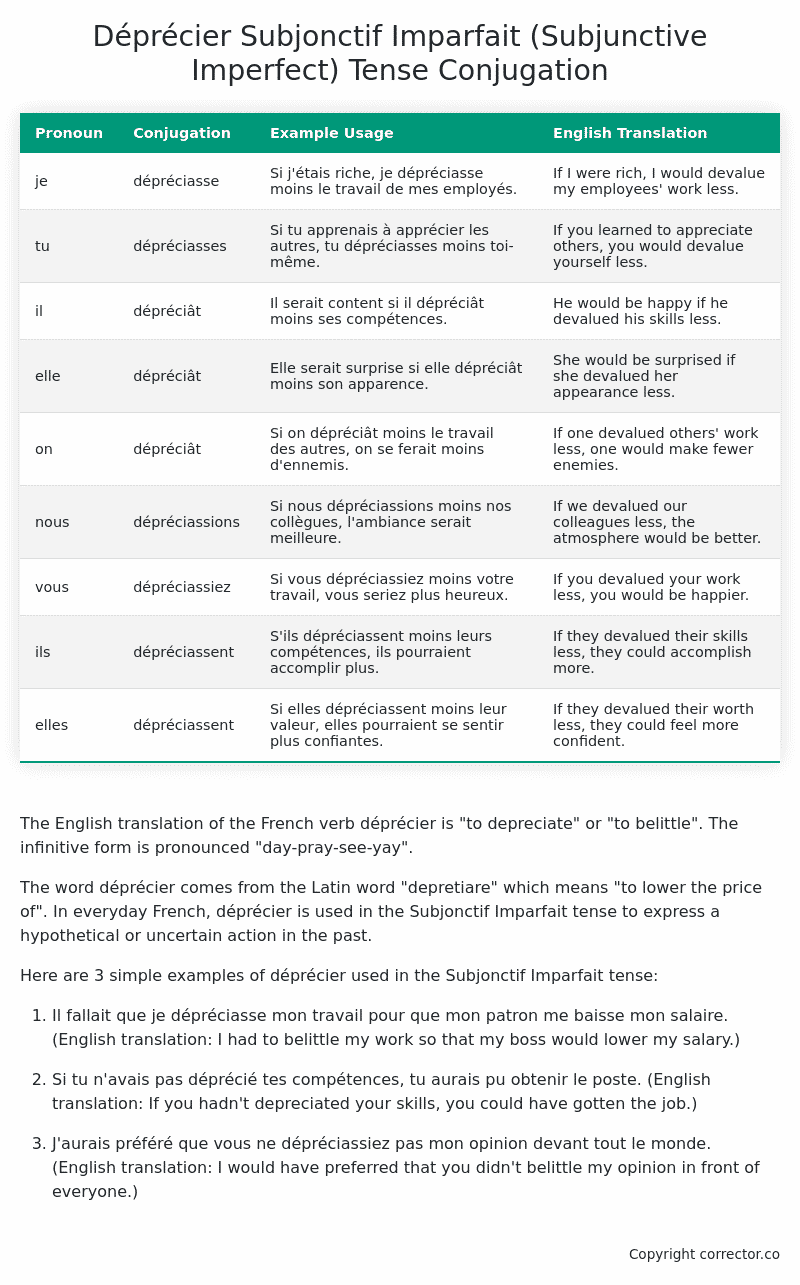Subjonctif Imparfait (Subjunctive Imperfect) Tense Conjugation of the French Verb déprécier
Introduction to the verb déprécier
The English translation of the French verb déprécier is “to depreciate” or “to belittle”. The infinitive form is pronounced “day-pray-see-yay”.
The word déprécier comes from the Latin word “depretiare” which means “to lower the price of”. In everyday French, déprécier is used in the Subjonctif Imparfait tense to express a hypothetical or uncertain action in the past.
Here are 3 simple examples of déprécier used in the Subjonctif Imparfait tense:
-
Il fallait que je dépréciasse mon travail pour que mon patron me baisse mon salaire.
(English translation: I had to belittle my work so that my boss would lower my salary.) -
Si tu n’avais pas déprécié tes compétences, tu aurais pu obtenir le poste.
(English translation: If you hadn’t depreciated your skills, you could have gotten the job.) -
J’aurais préféré que vous ne dépréciassiez pas mon opinion devant tout le monde.
(English translation: I would have preferred that you didn’t belittle my opinion in front of everyone.)
Table of the Subjonctif Imparfait (Subjunctive Imperfect) Tense Conjugation of déprécier
| Pronoun | Conjugation | Example Usage | English Translation |
|---|---|---|---|
| je | dépréciasse | Si j’étais riche, je dépréciasse moins le travail de mes employés. | If I were rich, I would devalue my employees’ work less. |
| tu | dépréciasses | Si tu apprenais à apprécier les autres, tu dépréciasses moins toi-même. | If you learned to appreciate others, you would devalue yourself less. |
| il | dépréciât | Il serait content si il dépréciât moins ses compétences. | He would be happy if he devalued his skills less. |
| elle | dépréciât | Elle serait surprise si elle dépréciât moins son apparence. | She would be surprised if she devalued her appearance less. |
| on | dépréciât | Si on dépréciât moins le travail des autres, on se ferait moins d’ennemis. | If one devalued others’ work less, one would make fewer enemies. |
| nous | dépréciassions | Si nous dépréciassions moins nos collègues, l’ambiance serait meilleure. | If we devalued our colleagues less, the atmosphere would be better. |
| vous | dépréciassiez | Si vous dépréciassiez moins votre travail, vous seriez plus heureux. | If you devalued your work less, you would be happier. |
| ils | dépréciassent | S’ils dépréciassent moins leurs compétences, ils pourraient accomplir plus. | If they devalued their skills less, they could accomplish more. |
| elles | dépréciassent | Si elles dépréciassent moins leur valeur, elles pourraient se sentir plus confiantes. | If they devalued their worth less, they could feel more confident. |
Other Conjugations for Déprécier.
Le Present (Present Tense) Conjugation of the French Verb déprécier
Imparfait (Imperfect) Tense Conjugation of the French Verb déprécier
Passé Simple (Simple Past) Tense Conjugation of the French Verb déprécier
Passé Composé (Present Perfect) Tense Conjugation of the French Verb déprécier
Futur Simple (Simple Future) Tense Conjugation of the French Verb déprécier
Futur Proche (Near Future) Tense Conjugation of the French Verb déprécier
Plus-que-parfait (Pluperfect) Tense Conjugation of the French Verb déprécier
Passé Antérieur (Past Anterior) Tense Conjugation of the French Verb déprécier
Futur Antérieur (Future Anterior) Tense Conjugation of the French Verb déprécier
Subjonctif Présent (Subjunctive Present) Tense Conjugation of the French Verb déprécier
Subjonctif Passé (Subjunctive Past) Tense Conjugation of the French Verb déprécier
Subjonctif Imparfait (Subjunctive Imperfect) Tense Conjugation of the French Verb déprécier (this article)
Subjonctif Plus-que-parfait (Subjunctive Pluperfect) Tense Conjugation of the French Verb déprécier
Conditionnel Présent (Conditional Present) Tense Conjugation of the French Verb déprécier
Conditionnel Passé (Conditional Past) Tense Conjugation of the French Verb déprécier
L’impératif Présent (Imperative Present) Tense Conjugation of the French Verb déprécier
L’infinitif Présent (Infinitive Present) Tense Conjugation of the French Verb déprécier
Struggling with French verbs or the language in general? Why not use our free French Grammar Checker – no registration required!
Get a FREE Download Study Sheet of this Conjugation 🔥
Simply right click the image below, click “save image” and get your free reference for the déprécier Subjonctif Imparfait tense conjugation!

Déprécier – About the French Subjonctif Imparfait (Subjunctive Imperfect) Tense
Formation
Common Everyday Usage Patterns
Interactions with Other Tenses
Subjonctif Présent
Indicatif Passé Composé
Conditional
Conditional Perfect
Summary
I hope you enjoyed this article on the verb déprécier. Still in a learning mood? Check out another TOTALLY random French verb conjugation!


